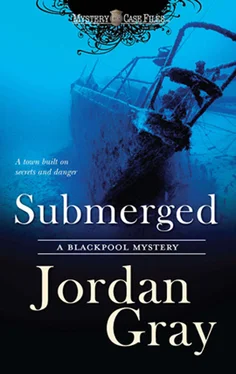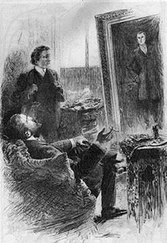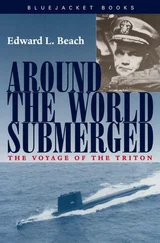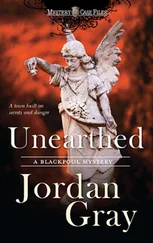“It’ll take as long as it takes,” Michael said, keeping his voice low. “Paddington’s pretty efficient. I have to admit, though, I would rather be poking around about the murder than here rubbing shoulders with the local officials and media.”
Not only had this event caught the attention of regional newspapers, as well as magazines and television stations, but rumor also had it that someone from the History Channel would be filming.
“Good thing the reporters haven’t heard about the dead man. Let them concentrate on your grants, Molly.”
“Focus on good news for a change, huh?” Molly scanned the crowd. She recognized people everywhere she turned. They were dressed informally for the most part, though she could see that the planning board members, town councilmen, business owners and the like had taken their appearance up a notch because of all the cameras.
There were tourists as well, like the group who’d filed off the bus.
And then there were the Gypsies. Her stomach twisted into a knot when she spied a group of them on the dock. They weren’t wearing coin belts and scarflike skirts or carrying tambourines as the movies portrayed them. In fact, they could have passed for tourists were it not for their exaggerated, mismatched garb, long hair, gold hoop earrings and swarthy complexions.
They were relatively new to Blackpool, and rumor had it that they were after the gold that the town’s founder, Charles Crowe, had stolen from their ancestors. The tallest one, who was about six feet, walked with a swagger and gestured wildly.
His name was Stefan Draghici, and she’d heard from the town gossips that he was the head of the family that was staying in Blackpool. His hair, cascading in coarse curls down to the middle of his back, was as dark as his eyes. Not a trace of gray in it, though she guessed him to be in his fifties. Draghici’s two sons and his wife must be nearby. She saw his daughter, Anjeza, dressed provocatively and drawing stares from Blackpool’s young men. The girl was, indeed, beautiful. The family reminded Molly of bloodhounds hot on a scent, though she wondered if the gold they were after really existed.
Well, they weren’t going to find any gold on the docks. But they’d certainly get publicity if they wanted it.
Michael noticed the focus of her attention. “Easy,” he said. “The Draghicis are probably down here to see what’s going on. Just like everyone else.”
“Yeah, I suppose. But I doubt they’re really in town for the groundbreaking.” She sidestepped a group of the red-hatted ladies, all of them dressed in varying shades of purple and wearing buttons proclaiming themselves the Brighton Belles.
“There she is!” shouted a silver-haired man with a camera perched on his shoulder. “There’s Molly Graham!”
A young woman holding a microphone shouldered her way past him and headed straight toward Molly. The reporter was dressed in a pale blue suit and had dark red lipstick that made Molly think she’d been sucking on a cherry Popsicle.
She swung to Molly’s side, held up the mike and adjusted her hair. “Jennessee Stanwood with Channel M of the Guardian Media Group, reporting live from Blackpool.” Jennessee stared straight into the camera.
Channel M was out of Manchester. Not one of the major stations there. Still, it was significant that they’d sent someone to cover the ceremony.
She tried to read the numbers and letters on the other cameras in the mix and spied an older reporter talking to one of the Blackpool planning board members a few yards away. With all the noise she couldn’t catch what they were saying.
“With me is Molly Graham, the woman who landed the grant to cover this renovation of the town’s historic and notorious harbor.” Jennessee droned on for another few moments, and then turned slightly to Molly, holding the microphone just under her chin. “Can you tell us why, Mrs. Graham, you’ve spent so much time working on this grant? I understand you were not paid to do this, and that you personally won’t make any profit from the construction.”
Molly saw Michael inch away, heading toward the café while pulling his iPhone out of his pocket, no doubt to talk about space-faring undead.
“I love Blackpool,” Molly began, “and I have experience going after grants. This one…”
“Six hundred and fifty thousand pounds, correct? And some matching local money on top of that?”
Molly nodded. “Which certainly will not cover everything, but will ensure that the history of the marina is preserved, keeping the original construction of the buildings intact, down to the hardwood floors, fixtures, tin ceilings in some cases. At the same time, we’re protecting the ecological integrity of the harbor, the whole wharf area. It’s an ambitious plan that—”
“Preserve history?” The voice cut loudly above the various conversations that floated in the air. “Preserve history?” The crowd quieted.
Molly couldn’t see the speaker at first, but a few heartbeats later he shouldered his way through the throng, the red-hatted ladies parting like the Red Sea to allow him passage.
It was Barnaby Stone, who owned a bait-and-tackle shop on the wharf.
“You’re not preserving anything, Molly Graham!”
The cameraman spun to record Barnaby, red-faced and shaking his fist. He had come dressed for the event in worn blue jeans and a bright yellow T-shirt with “Barnaby’s Bait” emblazoned in black letters on it.
Molly’s shoulders slumped. Barnaby had been one of the project’s opponents in the town meetings, but he’d never been this vocal.
The reporter stepped away from Molly and toward Barnaby, holding the microphone out.
“So much for focusing on the good news for a change,” Molly grumbled.
Other reporters jockeyed to get closer to Barnaby.
Jennessee smiled sweetly. “Could you tell us, Mr.—”
Barnaby didn’t give her a chance to finish the sentence. He plowed on with his rant, the camera getting every juicy word and catching every piece of spittle that flew from his bulbous lips.
“Ecology? Preserving history?” He stomped his foot and raised his fist higher.
Out of the corner of her eye, Molly noticed three planning board members trying to weave their way through the press of bodies. Farther back, a constable was angling toward them.
Hurry, she thought. Get Barnaby to shut up. It wasn’t her place to intervene, nor was she interested in a public debate. That had already occurred in board meetings.
“Ecology has nothing to do with this,” Barnaby continued. “It’s pounds from the tourists—that’s what this is all about. And tourists don’t buy enough of my bait to put food on my table.” He sucked in a deep breath. “This construction is going to put me out of business. That damn grant doesn’t cover the whole cost. I have to shell out from my own pockets. We all do! It’ll put a load of us under and our livelihoods down the loo.”
Jennessee tried to ask a question, but Barnaby kept going.
“A cancer is what Molly Graham has brought to Blackpool!”
“He’s right!” cried another business owner. “A cancer that will spread and kill us all.”
A prune of a woman shouldered her way into the mix. Miss Alice Coffey, Molly recognized with chagrin. The woman was the head of the August Historical Preservation Society, which—flip a coin—was alternately for and against the marina renovation. Most recently against—after Alice had met with Aleister Crowe.
Miss Coffey said something, but it couldn’t be heard above the ruckus.
“Go back to America!” someone hollered. “We don’t want your kind of help, Molly Graham.”
“Go back to New York! Get that city a green grant, why don’t you! That cesspool needs it more than Blackpool.”
Читать дальше












